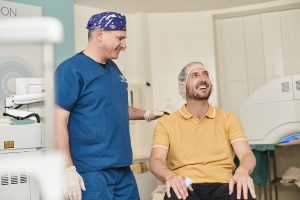Choosing the Best Laser Eye Surgeon for the Best Results

When considering Laser Eye Surgery, you want to be sure you are in the safe hands of a surgeon who can deliver the best possible results. After all, few things are more precious to us than our vision. But, while you wouldn’t trust your eyes in the hands of anyone but an expert, not all surgeons are created equal.
In many parts of our lives, we can make easy decisions based on things such as price and appearance fairly easily. While this is all well and good when it comes to picking a restaurant, the right pair of jeans, or a good plumber, when it comes to something like Laser Eye Surgery, much more stringent criteria becomes necessary.
In a field where fees, experience, and suitability vary so much from clinic to clinic, it can be difficult to know where to start when planning your Laser Eye Surgery treatment. What makes a good Laser Eye Surgeon and how can you be sure you’ll receive the very best treatment?
In this article, we will walk you through some things to look out for when choosing your surgeon for Laser Eye Surgery, including training, experience, access to the latest technology, and past results.
Relevant Training
It would be fair to assume that every Laser Eye Surgeon in the UK must have received the same level of training. However, due to the way the Laser Eye Surgery industry is regulated, this is not necessarily the case. In fact, the level of training received can vary significantly from surgeon to surgeon.
Despite being a specialist procedure, it is currently not necessary to have specialist training to become a Laser Eye Surgeon in the UK. Of course, there are minimum criteria for surgeons to be able to practice as a Laser Eye Surgeon – namely, a certificate from the Royal College of Ophthalmologists (RCO). This qualification is awarded following a one-day examination.
Furthermore, the availability of specialist refractive training is limited in the UK. As a result, many surgeons learn their trade on the job. However, there are other options. For example, the 12-month fellowship in Laser Refractive Surgery, developed by London Vision Clinic founder and Laser Eye Surgery pioneer, Professor Dan Reinstein.
We recommend that you enquire about your surgeon’s credentials before going ahead with treatment at any given clinic.
Experience and Patient Outcomes
They say that it takes a person 10,000 hours to become an expert in any field. Of course, in reality, many other factors can play a role. Nonetheless, experience is still an incredibly important thing to consider when choosing your Laser Eye Surgeon.
Generally, the longer a surgeon has been practising Laser Eye Surgery, the better. This means they will not only have completed a higher number of procedures but will likely have more experience treating a wider range of prescriptions.
Your chosen surgeon should be happy to disclose details of their experience, including providing you with details about their patient outcomes. It is also a good idea to specifically enquire about each surgeon’s experience in treating prescriptions similar to your own.
Access to the Latest Technology
As the name suggests, technology is a very important part of Laser Eye Surgery. Yet, even today, the technology available can vary significantly from clinic to clinic – especially when comparing independent clinics with high street providers. This can affect not only the type of treatments a clinic can offer but also what prescriptions they can treat.
While a surgeon may have all the necessary training and plenty of experience, it is often equally as important to have access to the latest technology. The world of Laser Eye Surgery is constantly evolving – and we’re not just talking about lasers! Laser Eye Surgery requires specialist devices in order to screen patients, make pre-operative assessments, and provide treatment and post-operative care, making this an important consideration when choosing your surgeon.
New techniques and state-of-the-art technology are always in development, and keeping up can give a surgeon the ability to offer the very best treatment to every patient. At London Vision Clinic, we can offer the latest treatments thanks to our access to the latest Laser Eye Surgery technology – much of which was co-developed by our very own founder, Prof. Dan Reinstein!
Choosing a Laser Eye Surgeon can be a daunting prospect, particularly if you’re not familiar with the process. However, applying these criteria will help to ensure you make the right decision so you can relax, knowing that you’re in the best possible hands.
If you have any questions about Laser Eye Surgery at London Vision Clinics or you would like to learn more about our expert surgeons, get in touch with one of our friendly clinic coordinators. Alternatively, if you’re ready to go ahead and check your suitability, Book a Consultation today.


